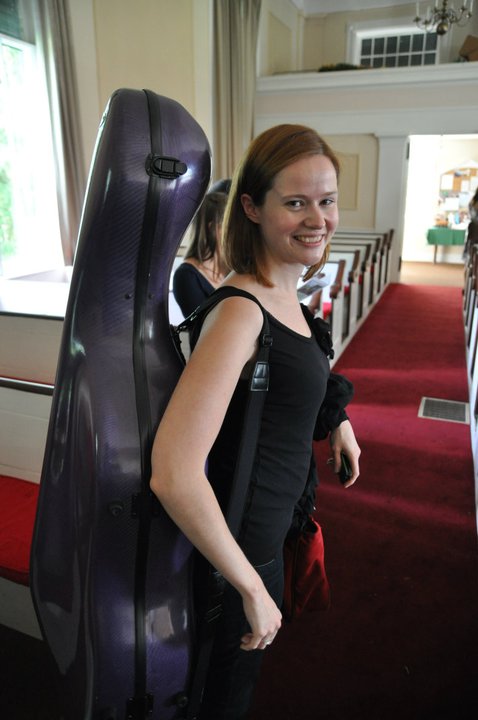"What do you do other than play in Fifth House?" as answered by Herine Coetzee Koschak
This week's Fifth House Weekly Inspiration Post is brought to you by Fifth House's marvelous cellist, Herine Coetzee Koschak. Check back at the end of each week for another dose of inspiration from our awe-inspiring ensemble members!
 In my life away from Fifth House, I am a Suzuki cello teacher.
In my life away from Fifth House, I am a Suzuki cello teacher.
When people who meet me as a performer hear this, I often get one of the following reactions:
1. Oh, [sympathetically] well it's just temporary, right? I guess you've got to do whatever it takes to pay the bills!
2. Funny, I thought that as a professional cellist you would WANT your students to learn how to read music.
3. Isn't teaching pre-schoolers a little like babysitting?
There are a lot of preconceived notions about Suzuki pedagogy floating about, and they often derive from legitimate observations. Becoming a Suzuki-trained teacher was an amazing path for me, especially since I didn't grow up with it and came to it well into my teaching career.
I started teaching at the Merit School of Music in 2002, when, in a financial leap of faith, I moved to Chicago to play in the Civic Orchestra. Truthfully, my primary motivator to start teaching was to pay the bills. Secondarily, my teacher, Janos Starker, had enforced upon me the importance of a balance of playing and performing, and the symbiotic relationship between them in his own life. Since I had very limited teaching experience, it seemed like a worthwhile personal and professional pursuit, especially since my other options for generating income would have been in the food service industry (in college, I lasted about five days manning the fries baskets at McDonalds), retail (my Fifth House nickname is "Shopasaurus" and I doubtless would have gone bankrupt buying stuff from my employer), or gigging (alas, I had no car).
Merit hired me to teach beginner group cello lessons in three inner-city schools in their off-site program. My first year was both exhilarating and insanely difficult; I found myself constantly thinking, "I can't believe they're PAYING me to do this!" and "I can't believe they're paying ME to do this!" My world became much larger that year. I experienced life through my students' eyes, offered them opportunities of ownership, expression and community through music, and saw all of those things come together in both wonderful and at times very sad ways, and all the while questioning my qualifications to be doing any of this at all!
I decided to get Suzuki training because I wasn't aware of other options for professional teacher development outside of college. The Chicago Suzuki Institute is a nine-day summer program taking place in Deerfield and brings together teachers, teacher-trainers, and students from all over the country. In my first few days of training for Suzuki Book 1, I was genuinely moved by the teachings of Dr. Shinichi Suzuki and his belief in the fundamental ability of every child regardless of intelligence or "tested" potential. Suzuki pedagogy breaks down the musical and physical aspects of playing to small digestable "nuggets" for a child to process, and then builds on these incrementally as the child attains skill.
From the beginning the pedagogy promotes an emphasis on proper set-up, tone quality and musical expression, with the instrument becoming a tool for personal commnication thus a means to spiritual and emotional development. The learning process imitates the "mother tongue" method of language acquisition, i.e. a small child learns language through rote (and thousands of hours of repetition) before learning how to read. The role of the parent as an equal participant is imperative in the early stages and continues until the child can take full ownership of his or her relationship with the instrument. Group teaching in conjunction with private lessons is also a large part of the Suzuki experience, creating a community of support and interaction.
These foundational principles are so empowering in teaching tiny children, and for that matter, anyone of any age! Being able to teach in this way expands my ability to have astonishing musical exchanges with a very young age group that I don't otherwise get to interact with -- not even in the many facets of Fifth House engagement activities. Seeing the world through a three year-old's eyes constantly brings new perspectives to my abilities to communicate as a performer and teacher. At the end of the day, I can teach a lesson on straight bowing to a Master's degree student at a festival, and I can also have that lesson (slightly modified, but not as much as you'd think!) with someone who was born after that Master's degree student went to college. In other words, so much of what we do comes back to the fundamentals, and being given the opportunity to explore that all the time is really fascinating to me.
My role in teaching has shifted a little bit in the last year with my acceptance of the Lower String Chair at Merit, and also the co-Musical Directorship of Merit's Alegre Strings, a Suzuki-based program that incorporates additional repertoire reflecting the diversity of our community and city. I continue to teach actively at Merit and also at Carthage College (where Fifth House maintains a residency).
Nine years ago, I couldn't possibly have dreamed up the professional opportunities that have materialized for me between Fifth House and teaching, and I feel blessed beyond words to have so much music in my life, and in the presence of such amazing people! Fifth House Ensemble
